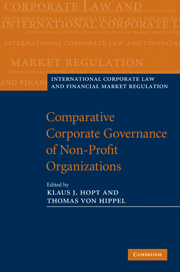Book contents
- Frontmatter
- Contents
- List of contributors
- Preface
- Abbreviations
- PART I Economic findings and theories on nonprofit organizations
- 1 The nonprofit sector: introductory remarks
- 2 Good and not so good governance of nonprofit organizations: factual observations from the USA and Europe
- 2.1 Good and not so good governance of nonprofit organizations: factual observations from the USA
- 2.2 Good and not so good governance of nonprofit organizations: factual observations from foundations in Germany
- 3 Economic theories of nonprofit organizations
- PART II The nonprofit sector: private law, trust law, tax law in selected countries
- PART III The board of nonprofit organizations
- PART IV Good governance of nonprofit organizations: activities and regulatory problems
- PART V Good governance of nonprofit organizations: self-regulation, disclosure and supervision
- Index
- References
2.1 - Good and not so good governance of nonprofit organizations: factual observations from the USA
from 2 - Good and not so good governance of nonprofit organizations: factual observations from the USA and Europe
Published online by Cambridge University Press: 05 August 2011
- Frontmatter
- Contents
- List of contributors
- Preface
- Abbreviations
- PART I Economic findings and theories on nonprofit organizations
- 1 The nonprofit sector: introductory remarks
- 2 Good and not so good governance of nonprofit organizations: factual observations from the USA and Europe
- 2.1 Good and not so good governance of nonprofit organizations: factual observations from the USA
- 2.2 Good and not so good governance of nonprofit organizations: factual observations from foundations in Germany
- 3 Economic theories of nonprofit organizations
- PART II The nonprofit sector: private law, trust law, tax law in selected countries
- PART III The board of nonprofit organizations
- PART IV Good governance of nonprofit organizations: activities and regulatory problems
- PART V Good governance of nonprofit organizations: self-regulation, disclosure and supervision
- Index
- References
Summary
Introduction
Since the fall of 2003, the philanthropic and nonprofit world in the United States has experienced an ongoing drumbeat of negative stories in the media that has ignited a prolonged, determined and aggressive effort by certain members of the Congress of the United States to enact reform legislation in an attempt to correct recognized abuses. As of this writing (late June, 2006), major reform legislation has yet to pass, but the pressure is still evident.
This ongoing effort to reform the governance and rules for nonprofits follows closely on the heels of dramatic failures of governance in the for-profit sector (such as Enron) that led to major legislation adding new restrictions and requirements on publicly traded companies: the Sarbanes-Oxley law passed in 2002. In fact, three months after this legislation passed, the Internal Revenue Service (IRS) issued an announcement seeking comments in several areas as to how they might improve the public reporting of charitable organizations. More specifically, the IRS stated:
– Recent events have raised concerns about the integrity of financial disclosures by publicly traded companies. In response to this, there has been a great deal of discussion, as well as recent legislation, relating to the need for new rules to ensure ethical accounting practices and the veracity of public disclosures by such companies.
– It may be argued that there are similarities between the need for veracity in the public information used by shareholders in making investment decisions and the need for veracity in the public information used by contributors and others in making decisions regarding exempt organizations.
- Type
- Chapter
- Information
- Publisher: Cambridge University PressPrint publication year: 2010
References
- 3
- Cited by



